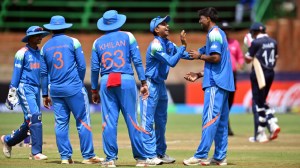Missing the Joke
If Howard Jacobson is the answer,whats the question?
Howard Jacobsons Man Booker win has been held up as a long-delayed acknowledgment of the comic novel about which he wrote a solemn little piece in The Guardian,but The Finkler Question isnt strictly a funny book. Its self-obsessed,often sad and theres a lot of setting up and foreshadowing that amounts to nothing.
The novel is about two life-long friends,Julian Treslove and Sam Finkler,and their old teacher Libor Sevcik. Newly bereaved and lonely,they spend more time with each other,discussing women,marriage and,always,Israel. Finkler being the first Jew that Treslove had met,he cutely calls all things Jewish Finklerish the minute you talked about the Finkler question,say,or the Finklerish Conspiracy,you sucked out the toxins. After one of these expansive evenings,Julian Treslove is mugged. He loses his belongings,but he finds a plot for the so-far aimless story of his life.
Believing that his female assailant whispered You Jew into his ear,Treslove is taken over by the idea of Jewishness. Jewish humour,Jewish introspection,Jewish neurotica he assimilates everything through this new lens. Between Tresloves nose-pressed-to-the-glass perspective,Libors long view of the century and Finklers status as an ASHamed Jew who denounces Israeli actions,the novel covers the spectrum. While Libor reverently turns to talk of Isrrrae,as if he couldnt bring himself to pronounce it fully,Finkler spits out words like Zionist and8230; Knesset as though they were curses. The Finkler Question goes on to catalogue all the usual tedious disputes about Israels destiny,Zionism and anti-Semitism.
None of the novels principal actors,except Libor,has any dimension.Treslove and Finkler are silly binaries,stick-figure characters,clusters of opposing attributes. Treslove,we are told repeatedly,is indeterminate in every way. He is not good-looking as much as he resembles good-looking people. His degree is a stew of several arts-related indisciplines,from archaeology to concrete poetry,stage-set and design,and the Russian short story.
Finkler,meanwhile,strides to success,with his spiky-sexy wife,his TV show and his fluffy philosophy bestsellers,with titles like The Existentialist in the Kitchen and The Little Book of Household Stoicism. He is oblivious to failure,while Treslove is passive,uncertain,awaiting something he doesnt even know how to recognise.
Tresloves overdeveloped sense of pathos is meant to be hilarious: with an operatic sense of romance,he is looking for a pallid woman who will ultimately die in his arms,and he keeps messing up. As schoolboys,when Treslove is told by a fortune-teller to await a woman named Juno,he confides in Finkler. His Jyou know Juno is mockingly mangled into DJew know Jewno by Finkler which is inexplicably held up as evidence of his unique linguistic brilliance.
Im mystified by the near-unanimity with which Jacobson has been anointed the supreme chronicler of British Jewishness,even our funniest living writer. Though wholly different,its not much better than Zadie Smiths The Autograph Man,which madly tabulated people and things and gestures as fundamentally Jewish or fundamentally goyish. While that was dismissed as superficial preening,The Finkler Question has been beatified by the Booker.
While it is both droll and moving in certain moments like Libors relationship with his wife Malkie,the novel is undone by the expectations created by its own bombastic blurb: a story of exclusion and belonging,justice and love,ageing,wisdom and humanity.
- 01
- 02
- 03
- 04
- 05































